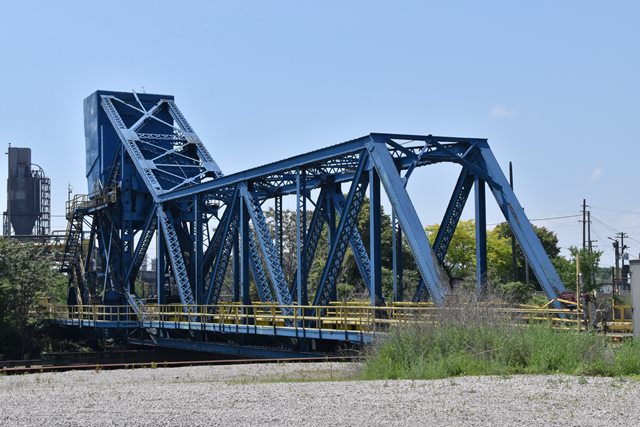We Recommend:
Bach Steel - Experts at historic truss bridge restoration.
BridgeHunter.com Phase 1 is released to the public! - Visit Now
Zug Island Road Bridge
Bridge 141

Primary Photographer(s): Nathan Holth
Bridge Documented: May 29, 2022
Zug Island Road and Railroad (Norfolk Southern and Delray Connecting) Over River Rouge
Detroit: Wayne County, Michigan: United States
Metal Rivet-Connected Warren Through Truss, Movable: Single Leaf Bascule (Rolling Lift)
1914 By Builder/Contractor: Pennsylvania Steel Company of Steelton, Pennsylvania and Engineer/Design: Scherzer Rolling Lift Bridge Company of Chicago, Illinois
Not Available or Not Applicable
140.0 Feet (42.7 Meters)
175.0 Feet (53.3 Meters)
Not Available
1 Main Span(s)
Not Applicable

View Information About HSR Ratings
Bridge Documentation
This bascule bridge features a combined highway and railroad deck, and is the main vehicular access to Zug Island. It is located in the Delray neighborhood of Detroit. Pennsylvania Steel Company was the superstructure contractor. Substructure contractor was Ginzel and Towler of Detroit, and the substructure design by the Engineering Dept. of Solvay Process Company. The bascule was the design of the famous Scherzer Rolling Lift Bridge Company.
There used to be two bridges at this location, the other bridge being a short distance east of this bridge. The other bridge was known as Bridge 210, also of the Delray Connecting Railroad. They were so close to each other, that a single bridgetender house was used for both bridges, and it was mounted on the other bridge. The other bridge was demolished, but the supporting structures that once supported the leaf, counterweight, and track remain in place as well as the bridgetender house which continues to be used for this bridge.
Total length given is an estimate. The span length is believed to be the bascule span length. Navigation charts show the navigable clearance to be 120 feet.
Please note only a limited photo gallery taken from a car is available for this bridge. This bridge and island is privately owned and access is fiercely defended by the security on the island. Do not approach the bridge unless you want to be forced to delete your photos off your camera with the guard's hand in contact with his firearm, a situation that someone else reported to HistoricBridges.org. The photos of this bridge were taken from Springwells Court, which is believed to have been a public road that ended in a cul-du-sac near the bridge, allowing for legal photography under United States law. However the new Gordie Howe Bridge is being built in this area, and perhaps related to that, it appears this road may be permanently removed as only gravel was present where a concrete road used to be. The actual Zug Island Road leading to the bridge may be public as well, however anyone attempting photos from that road should be aware that it leads directly to private property (the bridge) and many private security guards are unaware of US law as it relates to photography from public property and may confront visitors approaching the bridge.
Note there is another semi-historic bascule bridge (semi-historic because it was built in 1922 with the leaf replaced in 1957) on the south side of the island, but with no public roads of any kind, it is not possible to list this bridge on HistoricBridges.org unless someone has access to a boat and can get photos and share them with HistoricBridges.org. Please contact us if that is the case. A third bridge to the island, a swing bridge, is on the west side and is a modern welded 1976 bridge, and is not historic.
Please also see our River Rouge Bridges Part 2 Presentation for much more information and photos on the history of this and all the other Zug Island Bridges, which was created with the help of local railroad experts at the Michigan Railroad Club.
![]()
Photo Galleries and Videos: Zug Island Road Bridge
Bridge Photo-Documentation
Original / Full Size PhotosA collection of overview and detail photos. This gallery offers photos in the highest available resolution and file size in a touch-friendly popup viewer.
Alternatively, Browse Without Using Viewer
![]()
Bridge Photo-Documentation
Mobile Optimized PhotosA collection of overview and detail photos. This gallery features data-friendly, fast-loading photos in a touch-friendly popup viewer.
Alternatively, Browse Without Using Viewer
![]()
Maps and Links: Zug Island Road Bridge
Coordinates (Latitude, Longitude):
Search For Additional Bridge Listings:
Bridgehunter.com: View listed bridges within 0.5 miles (0.8 kilometers) of this bridge.
Bridgehunter.com: View listed bridges within 10 miles (16 kilometers) of this bridge.
Additional Maps:
Google Streetview (If Available)
GeoHack (Additional Links and Coordinates)
Apple Maps (Via DuckDuckGo Search)
Apple Maps (Apple devices only)
Android: Open Location In Your Map or GPS App
Flickr Gallery (Find Nearby Photos)
Wikimedia Commons (Find Nearby Photos)
Directions Via Sygic For Android
Directions Via Sygic For iOS and Android Dolphin Browser
USGS National Map (United States Only)
Historical USGS Topo Maps (United States Only)
Historic Aerials (United States Only)
CalTopo Maps (United States Only)

